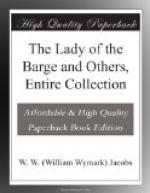He averted his face, and for a time gazed sternly and watchfully at the door. Then he rose slowly to his feet, and taking the dead man in his arms, bore him slowly and carefully to his room, and laid him a huddled heap on the floor. Swiftly and noiselessly he put the dead man’s shoes on and turned his pockets inside out, kicked a rug out of place, and put a guinea on the floor. Then he stole cautiously down stairs and set a small door at the back open. A dog barked frantically, and he hurried back to his room. The nurse still slumbered by the fire.
She awoke in the morning shivering with the cold, and being jealous of her reputation, rekindled the fire, and measuring out the dose which the invalid should have taken, threw it away. On these unconscious preparations for an alibi Captain Rogers gazed through half-closed lids, and then turning his grim face to the wall, waited for the inevitable alarm.
A TIGER’S SKIN
The travelling sign-painter who was repainting the sign of the “Cauliflower” was enjoying a well-earned respite from his labours. On the old table under the shade of the elms mammoth sandwiches and a large slice of cheese waited in an untied handkerchief until such time as his thirst should be satisfied. At the other side of the table the oldest man in Claybury, drawing gently at a long clay pipe, turned a dim and regretful eye up at the old signboard.
“I’ve drunk my beer under it for pretty near seventy years,” he said, with a sigh. “It’s a pity it couldn’t ha’ lasted my time.”
The painter, slowly pushing a wedge of sandwich into his mouth, regarded him indulgently.
“It’s all through two young gentlemen as was passing through ’ere a month or two ago,” continued the old man; “they told Smith, the landlord, they’d been looking all over the place for the ‘Cauliflower,’ and when Smith showed ’em the sign they said they thought it was the ’George the Fourth,’ and a very good likeness, too.”
The painter laughed and took another look at the old sign; then, with the nervousness of the true artist, he took a look at his own. One or two shadows—
He flung his legs over the bench and took up his brushes. In ten minutes the most fervent loyalist would have looked in vain for any resemblance, and with a sigh at the pitfalls which beset the artist he returned to his interrupted meal and hailed the house for more beer.
“There’s nobody could mistake your sign for anything but a cauliflower,” said the old man; “it looks good enough to eat.”
The painter smiled and pushed his mug across the table. He was a tender-hearted man, and once—when painting the sign of the “Sir Wilfrid Lawson”—knew himself what it was to lack beer. He began to discourse on art, and spoke somewhat disparagingly of the cauliflower as a subject. With a shake of his head he spoke of the possibilities of a spotted cow or a blue lion.




